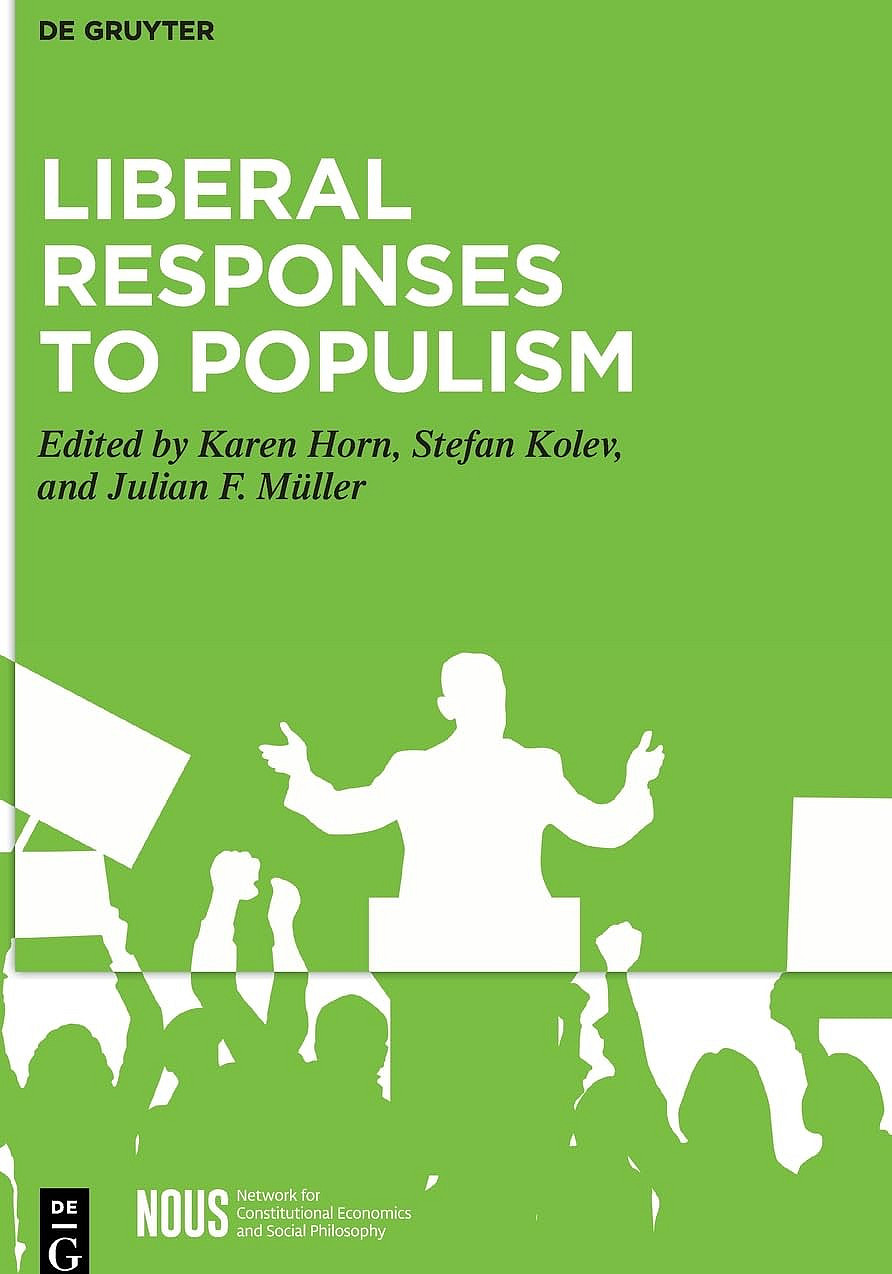Aktuelles am Arbeitsbereich Politische Philosophie
Philosophische Laufbahnen außerhalb der Akademie
Julian Müller lud als Sektionsleiter der Alumni-Philosophie zur Podiumsdiskussion
Mit einem inspirierenden Abend feierte die Alumni-Community der Philosophie an der Universität Graz ein lebendiges Comeback. Auf Einladung von Julian F. Müller, dem neuen Leiter der Alumni-Sektion Philosophie, und in enger Zusammenarbeit mit der Studienvertretung Philosophie kamen am Freitag, dem 16.01.2026, ehemalige Studierende ans Institut, um von ihren persönlichen und beruflichen Wegen nach dem Philosophiestudium zu berichten.
In einer offenen Podiumsdiskussion erzählten Alumni aus unterschiedlichsten Berufsfeldern – von Kultur- und Bildungsarbeit über Journalismus bis hin zu Digitalisierung und Beratung – von ihren Erfahrungen, Herausforderungen und Chancen abseits der akademischen Laufbahn. Deutlich wurde dabei, wie vielseitig ein Philosophiestudium auf das Berufsleben vorbereiten kann: Kritisches Denken, analytische Präzision, kommunikative Stärke und Reflexionsfähigkeit erwiesen sich in allen Bereichen als zentrale Qualifikationen.
Zu den eingeladenen Sprecher:innen zählten
Regina Wallner (Campus Unity GmbH, Rödemark),
Markus Seethaler (Bundesministerium für Wissenschaft, Ö),
Antonia Heigl (Dom Museum Wien),
Harald Koberg (Ludovico / Land Steiermark),
Raphael Reithuber (Journalist),
Robert Gutounig (FH JOANNEUM, Graz),
Margareta Dorner (Weiterbildende Bildung Österreich),
Otmar Kühner (Science Park Graz),
Ernst Krenn (AHS, Budapest) und
Paul Klingenberg (Uni-Press Graz Verlag).
Im Anschluss an die Diskussion bot ein gemeinsames Buffet Gelegenheit zum persönlichen Austausch zwischen aktuellen Studierenden, Lehrenden und Alumni.
Ein besonderer Dank gilt Frau Martina Mayer-Krauss von Alumni Uni Graz, die das Event mit großem Engagement begleitete und bereits auf der Alumni-Website ausführlich darüber berichtet hat. Dank der guten Zusammenarbeit zwischen Alumni Uni Graz, der Studienvertretung Philosophie und dem Alumni-Sektionsleiter Julian Müller konnte die Veranstaltung zu einem gelungenen Abend der Begegnung und Inspiration werden.
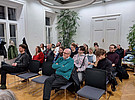
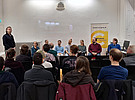
Kolloquium Vortrag
Alexandre Lefebvre: Soulcrafters. How States Rule Through The Good Life.
Alexandre Lefebvre von der University of Sydney wird einen spannenden Vortrag zu seiner aktuellen Arbeit “Soulcrafters: How States Rule Through The Good Life” halten.
Wann? 13.01.2026, 17:00
Wo? Hilmgasse 4, 8010 Graz
Der Vortrag ist öffentlich. Es wird trotzdem um eine Voranmeldung bei: julian.mueller(at)uni-graz.at gebeten.
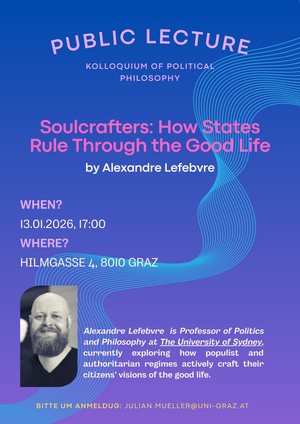
8. Workshop in Political Philosophy
The 8th Workshop in Political Philosophy will be held on January 9 and 10, 2026 at the University of Graz, Universitätsplatz 3, in a room called "Sitzungszimmer GEWI" (room number 0270). This edition of the series is organized by Julian F. Müller, David P. Schweikard, and Fabian Wendt. Like every year, the submitted abstracts were double-blind peer reviewed. The workshop is supported by the University of Graz and the Gesellschaft für Analytische Philosophie (GAP).
Where? Universitätsplatz 3, 8010 Graz - ‘Sitzungszimmer GEWI’ (RN: 0270)
When? January 09 and 10, 2026
What? Program
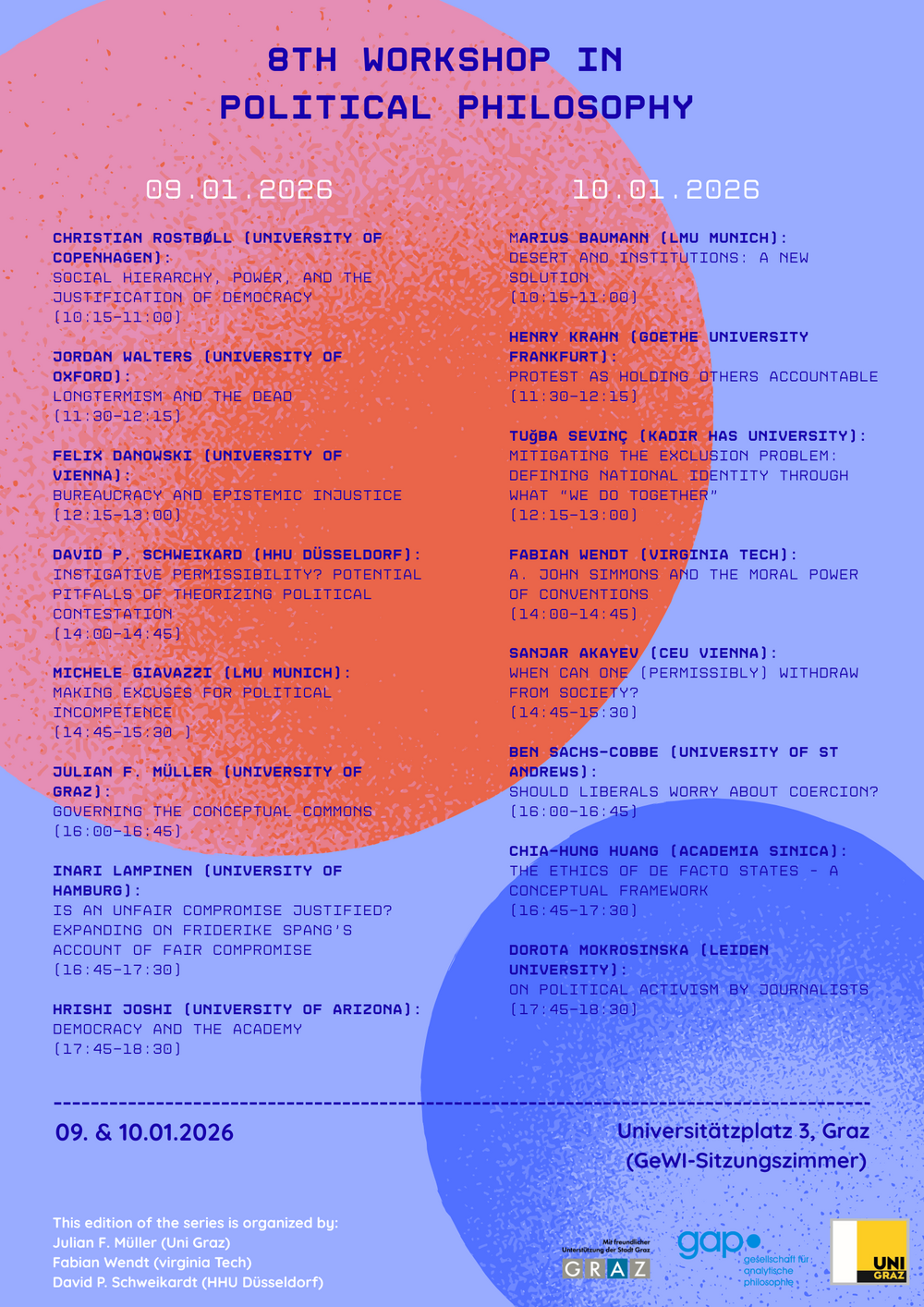
„Liberal, libertarian, populist, authoritarian?“ Workshop
Sabine Döring (Universität Tübingen), Stefan Kolev (Ludwig-Erhard-Forum and Westsächsische Hochschule Zwickau), Julian F. Müller (Universität Graz), Karen Horn (Universität Erfurt and NOUS Network)
The workshop “Liberal, libertarian, populist, authoritarian?” took place on April 15 in Berlin. It addressed the question—made particularly urgent by current political developments—of whether liberalism or libertarianism, either conceptually or in political practice, exhibits an inherent tendency toward authoritarianism, as is often claimed. If not, the aim was to clarify what fundamentally distinguishes them, thereby making it easier to draw a clear line between them and authoritarian populism, which frequently also claims to be rooted in liberal traditions.
Where? Ludwig Erhard Forum für Wirtschaft und Gesellschaft, Oranienburger Str. 4-5, 10178 Berlin
When? April 15, 2025
What? Program
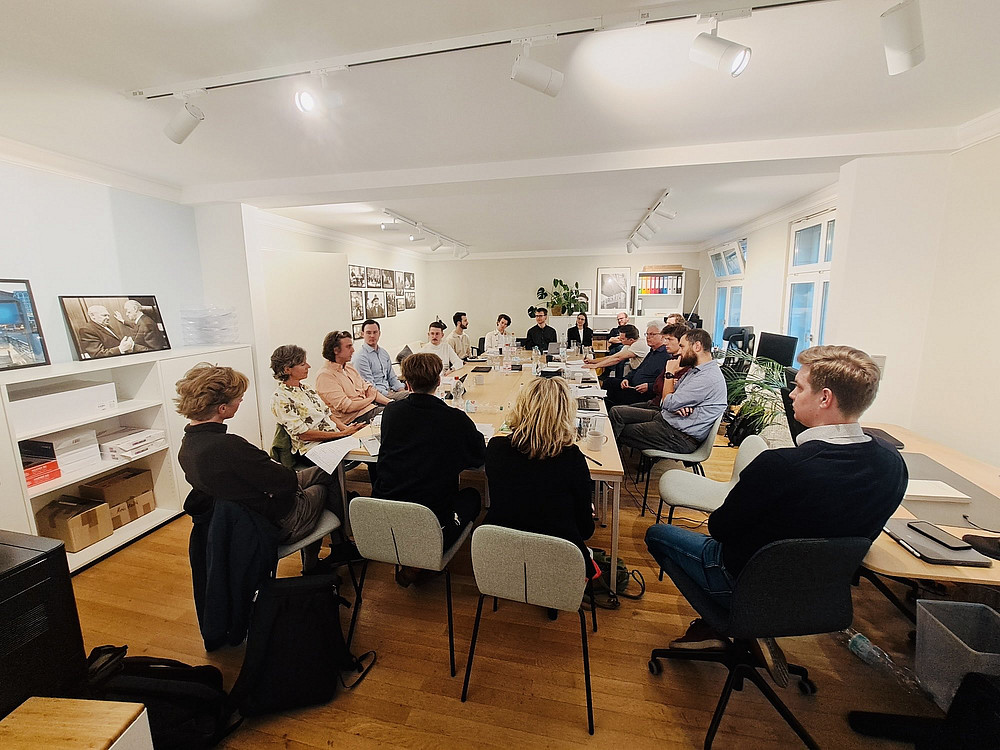
New Publication: Liberal Responses to Populism - January 2025
Edited by Karen Horn, Stefan Kolev, Julian F. Müller
Populism has taken root almost everywhere in the West. It is crucial to understand how it has come about, where its antagonistic worldview, its nativism, its illiberalism and its anti-pluralism will take us, and how we should seek to fend off this threat to liberal democracy. In particular, what could liberal answers look like?
This book is a collection of essays written by young and senior scholars in various fields from philosophy to economics. Part I explores populism’s nature and causes, shedding light on the lure of sovereignty, the perceived representation gap and the process of radicalization, and human psychology. Part II is dedicated to observations inside the political arena, pitting liberalism and populism in a historical perspective, analyzing the risk of democratic backsliding, and asking how liberals should navigate the political need to make compromises. In Part III, the focus turns to liberal responses such as rules-based public deliberation, a liberal ethics attending to civic virtues, improved representation through the blockchain, and polycentric migration policies. Part IV, finally, houses critical engagements with influential relevant authors such as Foucault, Laclau, Berlin, and Harrington.
7. Workshop in Political Philosophy
The 7th Workshop in Political Philosophy will be held on January 17 and 18, 2025 at the Philosophy Department of the University of Graz. This edition of the series is organized by Julian F. Müller (Graz), David P. Schweikard (HHU Düsseldorf), and Fabian Wendt (Virginia Tech). Like every year, the submitted abstracts were double-blind peer reviewed. The workshop is supported by the University of Graz and by the City of Graz.
Where? Hilmgasse 4, 8010 Graz
When? January 17 and 18, 2025
What? Program

Democracy on a Blockchain: The Cure for Populism? – 09/2024
Announcement: New Working Paper
Democracy on a blockchain: The cure for populism? (in: The Twin Challenges of Populism, forthcoming, with D. Johnson). Preprint online.
A principal-agent problem occurs when an agent (such as an elected representative) has interests that may not align with those of the principal (the constituents), leading to issues like corruption, information asymmetry, or difficulties in monitoring the agent's actions. Blockchain technology offers potential solutions by enhancing transparency through decentralized ledgers, which immutably record the actions of agents, and by improving accountability through smart contracts that automatically enforce agreed-upon conditions. Techno-optimists argue that blockchain technology could significantly reduce the misalignment of interests and strengthen democratic governance. In their new paper, Dylan and Mueller provide a critical appraisal of the idea of "cryptodemocracy" advanced by Allen, Berg and Lane (2019).

New Publications – 08/2024
We are happy to announce two new publications:
An Epistemic Account of Populist Ideology (Episteme 2023). Read online.
Some theorists believe that populism is nothing more than an
assembly of discursive patterns, while others maintain that it is a thin ideology that lacks a coherent set of guiding principles. In this paper, I show that populism can be fruitfully understood as a coherent ideology that rests on four foundational principles.
An Egalitarian Challenge to Increasing Epistemic Value
(Synthese 2023, wiith A. Ebrahimi Afrouzi). Read online.
The standard view in debates on epistemic democracy is that increasing epistemic value is an unconditional good. We show that epistemic value also has a distributive element, which puts doubt on the standard view.
